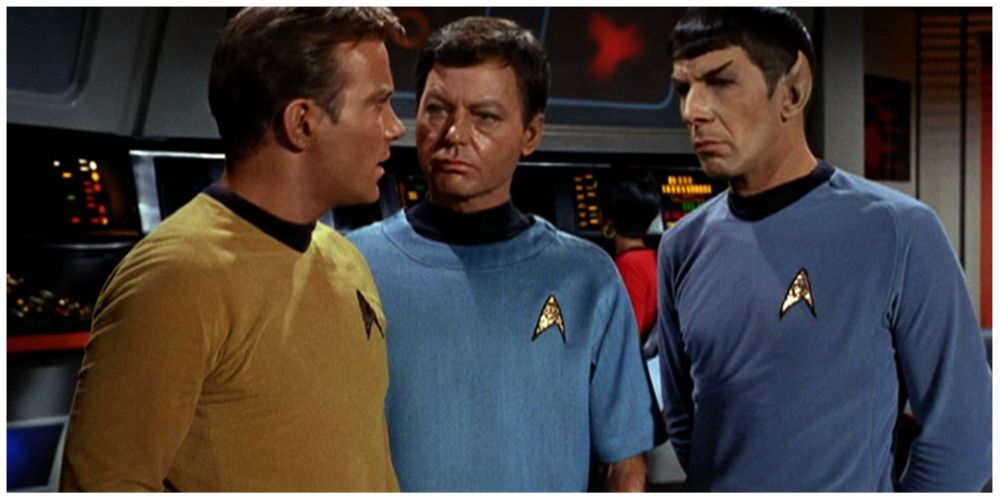The Star Trek universe is packed with a ton of fascinating new technology. The show is rarely about the science of its incredible inventions, but its world is constantly influenced by the ever-evolving machines. Thanks to all the benefits of the future, the human lifespan has sharply increased. Of all the characters in Star Trek, who would have thought that the oldest human on record is a familiar face?
Serialized fiction often features characters that may as well be immortal. If a show wants to run for dozens of years, it can't kill off a bunch of its most popular faces. This can feel cheesy in a soap opera, but a sci-fi show like Star Trek can simply explain their eternal lives with future technology.
Who is the oldest human in Star Trek?
The oldest known human in the mainline Star Trek canon is none other than the doctor of the USS Enterprise, Leonard "Bones" McCoy. McCoy canonically reached the age of 137. Non-canonical sources depicted him going on to become a Starfleet Captain, the head of the Starfleet Medical Academy, and the Starfleet Surgeon General. His death has never been depicted, so the highest point of McCoy's age is still unknown. At 137, he's the oldest confirmed human. Some edge cases challenge the definition of "human" and unseat him from his title, but Bones is the winner among traditional human beings.
With a much looser definition of "human," the oldest human is a man named Flint. Flint was an immortal who lived for more than 6,000 years on Earth. He was born in 3834 BC as an ancient soldier named Akharin. He went on to take several new names and careers as he lived his very long life. Flint was Methuselah, King Solomon, Alexander the Great, Lazarus, Merlin, Leonardo da Vinci, Johannes Brahms, and more. Flint knew Moses, Socrates, Jesus Christ, Galileo Galilei, Shakespeare, and more. His immortality was very poorly explained. He could consistently regenerate tissue and instantly heal from any injury for reasons that the show didn't feel the need to get into. Flint is unquestionably the oldest human who ever lived, but he is likely dead at this point in the canon. Dr. McCoy discovered that Flint's immortality was tied to some inherent quality of the planet Earth. After Flint left his home, his days were numbered. His death hasn't been depicted, but he was actively dying as the Enterprise crew left him.
Some augmented humans would outlast Dr. McCoy. Augments like Khan Noonien Singh enjoy lifespans that are at least twice as long as any ordinary human. Khan and his siblings are superhumans. They're incredibly fast and strong, resistant to any toxin, and capable of shrugging off wounds from almost any weapon. All of their organs are substantially better than those of ordinary humans. A blood transfusion from an augment can cure diseases. These beings can no longer reasonably be counted as humans. They'd outlive any ordinary person but only thanks to some outrageous cheating. Bones is the only honest winner of the title of oldest recorded human in the Star Trek canon.
Why do people live longer in the future?
The average life expectancy for a human being on Earth in 2022 was 72.98 years. That number is highly varied by country, with nations like Monaco nearing an average of 90 years. Twenty years ago, the worldwide average was around 67 years. In 1966, the year Star Trek debuted, the average lifespan was 53.73 years. That's an impressive increase over the last 57 years. According to the Star Trek canon, the average human lifespan will reach 100 years during the early 22nd century. By the mid-24th century, the mean crested 120 years.
This gradual increase in longevity is mostly thanks to advanced medical technology. Disease is a much less severe issue in the 24th century, medical outcomes are substantially better, and most issues that would end a human life prematurely have been dealt with. In addition, humans can enter suspended animation through the use of stasis chambers. This would allow a person to pass through decades without aging. While the subject wouldn't technically "live" these extra years, going into cryogenic slumber would allow a person to see eras they'd never experience otherwise. These technological advancements come alongside a general increase in social welfare. In a society that actually cares about its people, scarcity is a thing of the past. In the real world, tons of people die young due to avoidable policy choices. A world without poverty, thanks entirely to the reasonable redistribution of wealth and empathetic treatment of the needy, will always have better life expectancy than a world that allows the disadvantaged to die on the street.
Dr. Leonard McCoy is at the forefront of medical technology. He's a decent man who knows how to take care of himself and others. It's no surprise that he would understand how to keep himself alive far beyond the average life expectancy. At 137, Bones is the oldest human around, and he's still going strong.






